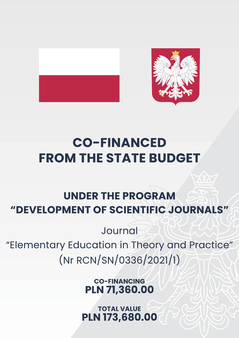Language Education in pedagogical concept of Maria Montessori
Abstract
Edukacja językowa pełni szczególną funkcję w koncepcji pedagogicznej M. Montessori. W swoich rozważaniach na temat rozwoju dziecka autorka wiele miejsca poświęca ukazaniu, w jaki sposób dziecko nabywa umiejętność mówienia i komunikowania się z otoczeniem. Podkreśla też znaczenie języka w kształtowaniu osobowości dziecka oraz całych społeczeństw, ich kultury i cywilizacji. Celem artykułu jest przybliżenie teoretycznych i metodycznych podstaw edukacji językowej oraz ukazanie jej przewodniej i integracyjnej roli w koncepcji pedagogicznej M. Montessori. W pierwszych punktach tego artykułu ukazuję podstawy filozoficzne, psychologiczne i metodyczne systemu pedagogicznego M. Montessori, a następnie przedstawiam cele, treści i sposoby ich realizacji w przedszkolu.References
Guz S., System pedagogiczny Marii Montessori w teorii i praktyce, [w:] Metoda Marii Montessori. Historia i współczesność, pod red. S. Guz, UMCS, Lublin.
Honegger Fresco G., Cronologia di una vita, [w:] Montessori perché no? Una pedagogia per la crescita, FrancoAngeli, Mediolan 2000.
Montessori M., Come educare il potenziale umano, Garzanti, Mediolan 1992.
Montessori M., L’autoeducazione nelle suole elementari, Garzanti, Mediolan 1992.
Montessori M., La formazione dell’uomo, Garzanti, Mediolan 1993.
Montessori M., La mente del bambino, Garzanti, Mediolan 1992.
Montessori M., Wychowujcie dla pokoju. Dlaczego dziś wychowanie może mieć wpływ na świat?, [w:] Pedagogika Marii Montessori w Polsce i na świecie, pr. zb. pod red. B. Surmy, Palatum-Ignatianum, Łódź- Kraków 2009.
Pedagogika Marii Montessori w Polsce i na świecie, Surma B.(red.), Palatum-Ignatianum, Łódź- Kraków 2009.
Przetacznik-Gierowska M., Tyszkowa M., Psychologia rozwoju człowieka, PWN, Warszawa 2000, cz. 1.
Surma B., Pedagogika Montessori – podstawy teoretyczne i twórcze inspiracje w praktyce, Palatum, Łódź 2008.
Żebrowska M., Teorie rozwoju psychicznego, [w:] Psychologia rozwojowa dzieci i młodzieży, pod red. M. Żebrowskiej, PWN, Warszawa 1975.
Copyright (c) 2016 Elementary Education in Theory and Practice

This work is licensed under a Creative Commons Attribution-NoDerivatives 4.0 International License.
- When submitting a text, the author declares that he/she is the Author of the article (hereinafter referred to as the “Work”) and:
- he/she owns the exclusive and unlimited copyright to the Work,
- is entitled to dispose of the copyright to the Work.
Declares that it does not infringe any third party copyrights or legal rights.
Declares that there is no conflict of interest.
2. At the same time, the Author grants the Ignatianum University in Cracowa royalty-free, non-exclusive and territorially unlimited licence to use the Work in the following fields of exploitation:
- recording the Work in a hard copy, as well as on a digital or magnetic medium;
- reproduction of the Work using any technique, without limitation of the number of editions or copies;
- distribution of the Work and its copies on any medium, including marketing, sale, lending, and rental;
- introduction of the Work into a computer memory;
- disseminating the Work in information networks, including in the Internet;
- public performance, exhibition, display, reproduction, broadcasting and re-broadcasting, as well as making the Work available to the public in such a way that everyone can have access to it at a time and place of their own choosing;
- within the scope of dependent rights to the Work, including in particular the right to make necessary changes to the Work resulting from editorial and methodical development, as well as to translate the Work into foreign languages;
The licence is granted from the moment of the transfer of the Work to the Ignatianum University in Cracow. The Ignatianum University in Cracow is entitled to grant further sub-licences to the Work within the scope of the right granted. The licence is time-limited and it is granted for a period of 15 years, starting from the date of its granting.
Authors are permitted and encouraged to publish their text online (e.g. in their institution’s repository or on the institution’s website) before or during the submission process as this may lead to beneficial exchanges, as well as earlier and greater citation of the published text (See The Effect of Open Access). We recommend using any of the following portals of research associations:
- ResearchGate
- SSRN
- Academia.edu
- Selected Works
- Academic Search





